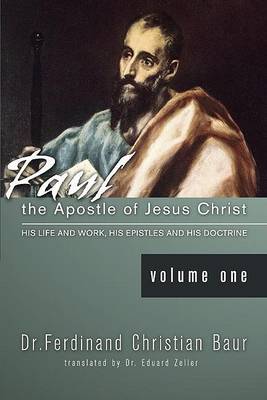"One hundred and sixty years ago F. C. Baur posed, in inescapably sharp form, a question which has haunted Christianity throughout its history: is Christianity simply a form of Judaism, development from Judaism, or was it, as Baur argued, from the beginning something quite distinct, a religious spirit or consciousness which could not be or become itself until it broke through the limits and restrictions of its historical origins? Baur's radical answer set the agenda for the rest of the nineteenth century, and though neglected for most of the twentieth century, the question has reemerged with renewed force in a post-Holocaust world."--James D. G. Dunn, Emeritus Lightfoot Professor of Divinity, University of Durham
"It will be extremely helpful to New Testament critics to have F. C. Baur's influential work on Paul--long out of print and often no longer even available on most theological library shelves--conveniently at hand. Baur's application of Hegel's dialectical theories to the writings of Paul profoundly shaped the discourse of his mid-nineteenth-century German contemporaries, including that of those who sought to challenge certain aspects of his interpretation. They did not escape the powerful force of his conceptualization of the world, including a deeply negative evaluation of the Oriental spirit (i.e., Judaism and Jewishness), which was central to his project. The legacy of these developments--the so-called TUbingen school--has deeply influenced NT studies (and arguably world history) ever since and continues to assert its influence on the interpretation of Paul's voice to this day, although often now in unrecognized ways. With the availability of this edition, that is about to change."--Mark D. Nanos, author of The Galatians Debate, The Irony of Galatians, and The Mystery of Romans
"Perhaps the most influential book of nineteenth-century New Testament scholarship, Paul the Apostle of Jesus Christ offered a novel, breathtaking synthesis of the apostle's place in the development of early Christianity. . . . In seeking the authentic writings of Paul, the generative center of his thought, the role of the law and its relationship to the gospel of Jesus Christ, the historical value of the book of Acts, and the views of Paul's opponents, Baur's work set an agenda that continues to dominate modern inquiry."--A. Andrew Das, Niebuhr Distinguished Chair, professor of religious studies, Elmhurst College
"The history of Pauline and even New Testament studies is a continuing dialogue with the assumptions and conclusions of Ferdinand Christian Baur. No Pauline scholar--recent efforts notwithstanding--has so shaped the set of questions asked of Paul's letters as did Baur. This is not to say that Baur got it right--far from it. He was no doubt wrong, and sometimes quite wrong, on a number of crucial issues in each of the areas that he so significantly influenced. Nevertheless, his legacy regarding the influence of fundamental conflicts in the early church, and the need for critical rather than simply theological scrutiny of the letters, is still of importance as we continue to study Paul's letters in the context of the New Testament and early Christianity."--Stanley E. Porter, president, dean, and professor of New Testament, McMaster Divinity College
- ISBN10 1592443370
- ISBN13 9781592443376
- Publish Date 11 September 2003
- Publish Status Active
- Publish Country US
- Imprint Wipf & Stock Publishers
- Format Paperback (US Trade)
- Pages 736
- Language English
